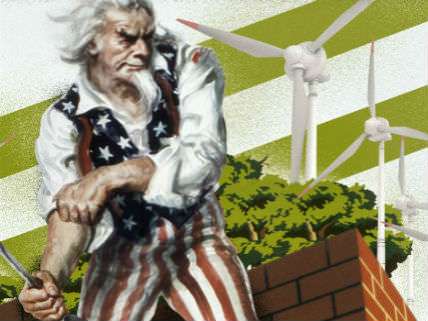A War on Climate Change?
We are supposed trust government technocrats - what could possibly go wrong?

Various folks have analogized their proposals for solving the man-made climate change problem to the Apollo moon landing program, the Manhattan Project's development of atomic bombs, or the Marshall Plan's rescue of Western Europe from communism.
Last week, over at The Atlantic Venkatesh Rao suggested the war analogy; specifically, the U.S. total mobilization of personnel and materiel for World War II. The climate change war needs to be declared with the adoption of a Universal Climate Treaty at the UN Climate Change conference in Paris this December. As Rao argues:
Properly qualified, there is only one successful precedent for the kind of technological mobilization we are contemplating: the mobilization of American industry during World War II.
The proposed climate change war—and no other term is suitable given the scale, complexity, and speed of the task—requires a level of trust in academic and energy-sector public institutions (including international ones) comparable to the trust placed in military institutions during times of war. …
We either trust public institutions, based on specialized expertise, and accept the risk that they might be wrong, as in the case of the intelligence establishment and WMDs in Iraq—or we limit collective action to issues where it is possible to achieve informed consensus among laypersons. …
We are not being asked to understand, en masse, the intricacies of climate science and technology deployment any more than the population of a nation at war is asked to understand the intricacies of intelligence gathering or military campaign planning. We are being asked to trust the integrity and declared intentions of institutions that do understand the intricacies. We are being asked to trust that despite any de facto ideological biases, professionalism will prevail.
In the war against climate change, powerful technocrats will be far more consequential than energy-sector technologists. …
Climate change is not a game for amateurs. The evolving nature of the science, and the possibility (always present in science) that some of today's beliefs might be overturned by new evidence and models, is not a reason to second guess scientists or trust conspiracy theorists instead. That doesn't mean we don't risk corporatist corruption, cronyism, and outright wartime profiteering. But we do not yet know how to act beyond a certain scale and speed without those risks.
So a technocrat-led, government-coordinated international response is probably necessary.
An interesting perspective no doubt, but Rao does not try to answer the critical question: Will government solutions to global warming be worse than global warming itself?
Even the reports from the U.N.'s Intergovernmental Panel on Climate Change suggest that with regard to the welfare of future generations the costs of doing nothing about climate change could well equal the costs of doing something now about climate change.


Show Comments (138)